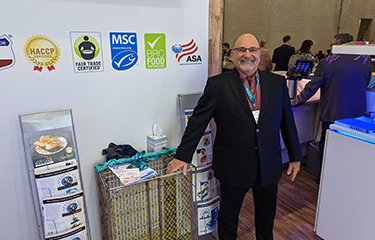The scallop market will be hard to predict in 2023 as supplies stay flat and demand becomes the main influence on pricing pressure, Northern Wind CEO Ken Melanson told SeafoodSource.
Melanson, addressing the topic at the 2023 Seafood Expo North America, on behalf of his New Bedford, Massachusetts, U.S.A. company, said scallop prices haven’t followed their typical trajectory given the flat supply.
“We’ve had those conversations with customers today, and they’re the same – they’re asking the question that I’m still asking myself, why is the price so low today?” Melanson said. “When typically, when we’re going through this process all of the inventories have been close to depleted and have been flushed through the system.”
The largest scallop-fishing season in the U.S. Northeast – much of which passes through New Bedford, Massachusetts – starts on 1 April, which means most companies will be running out of stored supply as the fishing season approaches.
“Because we’re so close to a new season, [the price] probably should have raised a little bit in January and February and March, and it didn’t. It actually fell,” Melanson said.
Higher interest rates, stemming from the U.S. Federal Reserve raising rates to stave off inflation, have made carrying more inventory a “heavier lift” than it was a year ago, Melanson said. Plus, inflation is hitting consumers and forcing them to make new decisions on where to spend their money.
“How much more money does the consumer have? What are they going to buy?” Melanson said. “Are they going to buy the high-priced scallop or lobster, or are they going to buy codfish or something that’s the same protein with a much lower cost. That remains to be seen.”
Melanson said the market is effectively in a “whole new world” post-Covid, making it tough to determine where prices or volumes will move. Scallop sizes will also be hard to predict as open fishing areas shift this year.
“We don’t see any visibility on anything, the price or programs, with all of the big guys on scallops until second week of May, third week of May,” Melanson said. “A lot of the customers that I deal with, our program business, told me, ‘Don’t expect us to put that program in place until further on.’”
With everyone holding back, it’s a toss-up, according to Melanson: A spike in demand could cause scallop prices to jump as companies rush to get the product they need in a tight market, or soft demand could cause the situation to remain unchanged, or even cause prices to fall further.
Regarding of the state of the market, the upcoming season will be a busy one for Northern Wind, as it continues to integrate with Suncoast Seafood Inc. and Raymond O’Neill & Son Fisheries following their acquisition by ACON Investments. The three companies have merged into Atlantic Sustainable Catch, and Melanson said the integration process, while a “work in progress,” is gradually making it operate as one company.
“We’ve been working on that for the last 18 months, we’ve been making terrific headway,” he said.
The company is now selling lobsters – and the company announced in early March it is working on enhancing the traceability of its products. Melanson added that the company is also experimenting with ropeless gear as a way to avoid conflicts with critically endangered North Atlantic right whales. The company’s booth at SENA had one of the traps it is working with on display to highlight its efforts.
“I think that’s probably one, if not two, years out,” Melanson said.
Photo by Chris Chase/SeafoodSource







